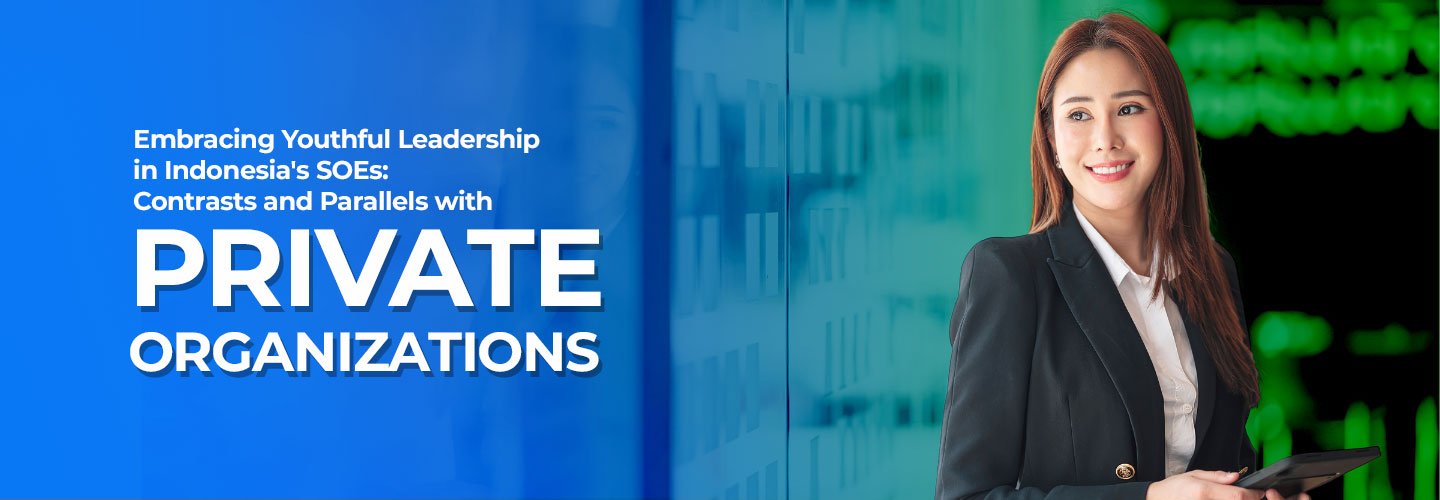
In the dynamic landscape of Indonesia's State-Owned Enterprises (SOEs), a significant shift is underway—one that embraces the ascendancy of young leaders into pivotal management positions. This evolution, instigated by the Ministry of SOE as part of the visionary "Indonesia Emas 2045" development strategy, aims to augment the youthful quotient in leadership by 10% within the upper echelons of these enterprises by 2023, with a gradual increase over the next decade.
This initiative marks a departure from traditional leadership paradigms, where experience and seasoned tenure were oftentimes deemed paramount. However, it's met with diverse perspectives among employees, as illuminated by a recent survey conducted by prasmul-eli. Out of 111 participants, 38% opined that the ideal age range for leaders in SOEs spans between 39 to 44 years old, while 28% advocated for the 45 to 50 years old bracket. Their rationale pivoted on attributes like experience, maturity, and wisdom—qualities typically associated with seasoned leaders.
This dichotomy between perception and initiative underscores the challenge faced by SOEs in fostering acceptance of younger leaders. Yet, it prompts a deeper inquiry into the impact of youthful leadership not only in these state-driven enterprises but also in the private sector—a domain where norms and practices may differ significantly.
To explore this, a comprehensive survey is being conducted, delving into the reception and influence of young leaders within both public and private organizations. The primary objective is to gauge how private enterprises perceive and integrate youthful leadership within their senior management structures, juxtaposed against the trajectory witnessed in SOEs.
In the private sector, the reception of young leaders in senior positions historically varied, often depending on the industry, corporate culture, and prevailing leadership ideologies. Unlike the prescribed shift observed in SOEs, private entities may showcase a more eclectic reception, where some readily embrace the fresh perspectives and innovative vigour of younger leaders, while others remain entrenched in more traditional hierarchies.
The essence lies in discerning whether private organizations echo the trajectory of SOEs in embracing youthful leadership. Are they equally inclined to harness the potential of younger leaders to navigate the evolving landscapes of business and innovation? Or does the allure of experience and entrenched norms continue to dominate their leadership outlook?
We invite you to be a part of this journey by sharing your valuable perspectives in our Young Leader survey. Your participation will contribute to a comprehensive understanding of the role of young leaders in driving positive culture within companies across sectors.
Click the survey link below to join us in shaping the narrative of leadership evolution:
https://bit.ly/ylsurvey-eli
We're committed to unveiling the findings of this extensive study. Anticipate the publication of results by Q1 of 2024, where we'll present a nuanced analysis that sheds light on the impact, challenges, and opportunities posed by young leaders in shaping Indonesia's corporate landscape, both in private and public sectors.
Thank you for your participation and continued support in this quest for insights and excellence.

In the dynamic landscape of Indonesia's State-Owned Enterprises (SOEs), a significant shift is underway—one that embraces the ascendancy of young leaders into pivotal management positions. This evolution, instigated by the Ministry of SOE as part of the visionary "Indonesia Emas 2045" development strategy, aims to augment the youthful quotient in leadership by 10% within the upper echelons of these enterprises by 2023, with a gradual increase over the next decade.
This initiative marks a departure from traditional leadership paradigms, where experience and seasoned tenure were oftentimes deemed paramount. However, it's met with diverse perspectives among employees, as illuminated by a recent survey conducted by prasmul-eli. Out of 111 participants, 38% opined that the ideal age range for leaders in SOEs spans between 39 to 44 years old, while 28% advocated for the 45 to 50 years old bracket. Their rationale pivoted on attributes like experience, maturity, and wisdom—qualities typically associated with seasoned leaders.
This dichotomy between perception and initiative underscores the challenge faced by SOEs in fostering acceptance of younger leaders. Yet, it prompts a deeper inquiry into the impact of youthful leadership not only in these state-driven enterprises but also in the private sector—a domain where norms and practices may differ significantly.
To explore this, a comprehensive survey is being conducted, delving into the reception and influence of young leaders within both public and private organizations. The primary objective is to gauge how private enterprises perceive and integrate youthful leadership within their senior management structures, juxtaposed against the trajectory witnessed in SOEs.
In the private sector, the reception of young leaders in senior positions historically varied, often depending on the industry, corporate culture, and prevailing leadership ideologies. Unlike the prescribed shift observed in SOEs, private entities may showcase a more eclectic reception, where some readily embrace the fresh perspectives and innovative vigour of younger leaders, while others remain entrenched in more traditional hierarchies.
The essence lies in discerning whether private organizations echo the trajectory of SOEs in embracing youthful leadership. Are they equally inclined to harness the potential of younger leaders to navigate the evolving landscapes of business and innovation? Or does the allure of experience and entrenched norms continue to dominate their leadership outlook?
We invite you to be a part of this journey by sharing your valuable perspectives in our Young Leader survey. Your participation will contribute to a comprehensive understanding of the role of young leaders in driving positive culture within companies across sectors.
Click the survey link below to join us in shaping the narrative of leadership evolution:
https://bit.ly/ylsurvey-eli
We're committed to unveiling the findings of this extensive study. Anticipate the publication of results by Q1 of 2024, where we'll present a nuanced analysis that sheds light on the impact, challenges, and opportunities posed by young leaders in shaping Indonesia's corporate landscape, both in private and public sectors.
Thank you for your participation and continued support in this quest for insights and excellence.